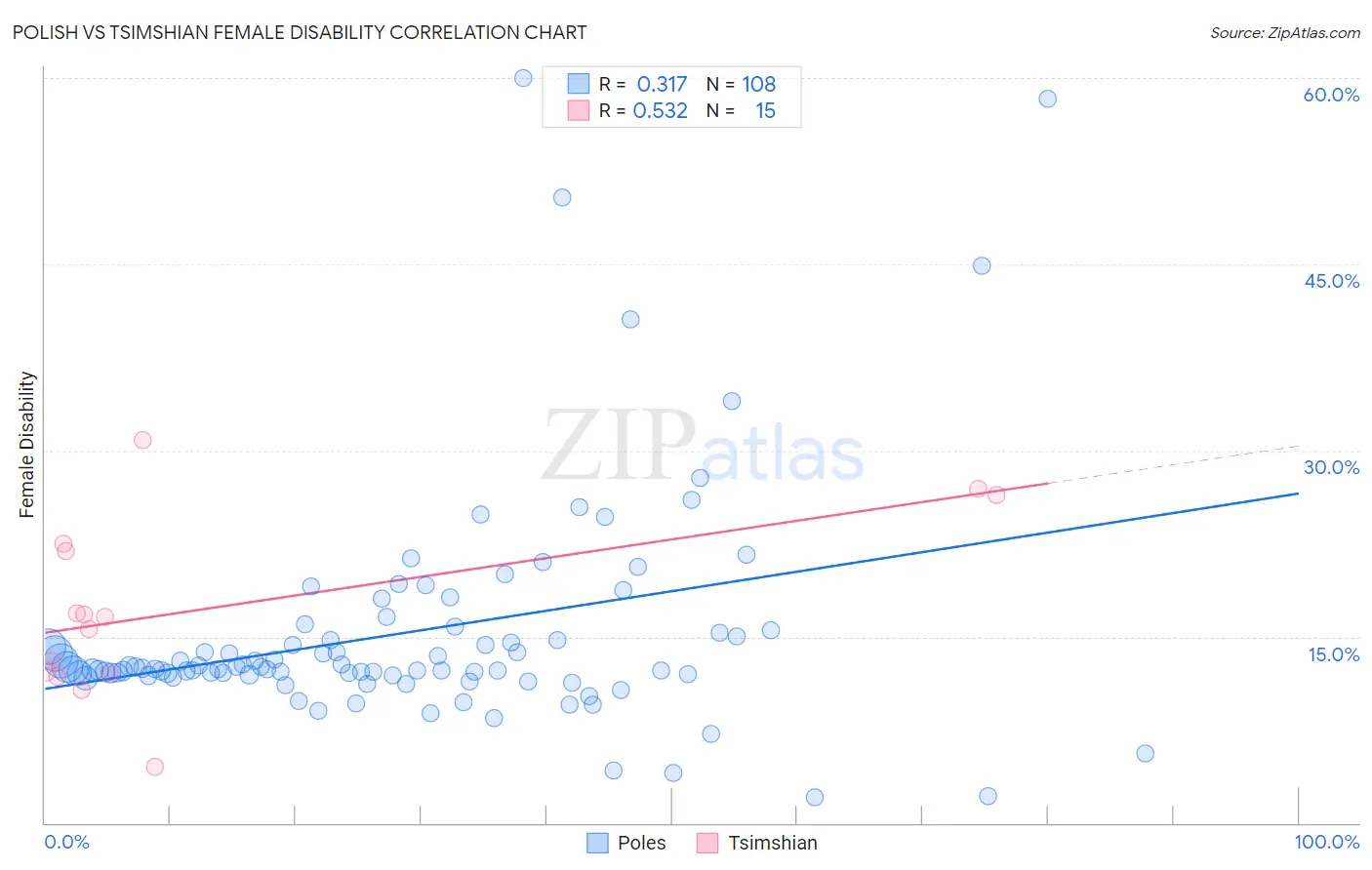Polish vs Tsimshian Female Disability
COMPARE
Polish
Tsimshian
Female Disability
Female Disability Comparison
Poles
Tsimshian
12.5%
FEMALE DISABILITY
8.4/ 100
METRIC RATING
225th/ 347
METRIC RANK
16.8%
FEMALE DISABILITY
0.0/ 100
METRIC RATING
346th/ 347
METRIC RANK
Polish vs Tsimshian Female Disability Correlation Chart
The statistical analysis conducted on geographies consisting of 560,308,086 people shows a mild positive correlation between the proportion of Poles and percentage of females with a disability in the United States with a correlation coefficient (R) of 0.317 and weighted average of 12.5%. Similarly, the statistical analysis conducted on geographies consisting of 15,626,462 people shows a substantial positive correlation between the proportion of Tsimshian and percentage of females with a disability in the United States with a correlation coefficient (R) of 0.532 and weighted average of 16.8%, a difference of 34.5%.

Female Disability Correlation Summary
| Measurement | Polish | Tsimshian |
| Minimum | 2.1% | 4.5% |
| Maximum | 60.0% | 30.9% |
| Range | 57.9% | 26.4% |
| Mean | 15.3% | 17.3% |
| Median | 12.4% | 16.6% |
| Interquartile 25% (IQ1) | 11.9% | 12.0% |
| Interquartile 75% (IQ3) | 15.2% | 22.5% |
| Interquartile Range (IQR) | 3.2% | 10.5% |
| Standard Deviation (Sample) | 9.3% | 7.2% |
| Standard Deviation (Population) | 9.3% | 6.9% |
Similar Demographics by Female Disability
Demographics Similar to Poles by Female Disability
In terms of female disability, the demographic groups most similar to Poles are Hispanic or Latino (12.5%, a difference of 0.050%), Assyrian/Chaldean/Syriac (12.5%, a difference of 0.060%), Immigrants from Cambodia (12.5%, a difference of 0.080%), Belizean (12.5%, a difference of 0.10%), and Guamanian/Chamorro (12.5%, a difference of 0.12%).
| Demographics | Rating | Rank | Female Disability |
| Immigrants | Bahamas | 12.5 /100 | #218 | Poor 12.4% |
| Europeans | 12.1 /100 | #219 | Poor 12.4% |
| Bahamians | 11.1 /100 | #220 | Poor 12.4% |
| Native Hawaiians | 10.8 /100 | #221 | Poor 12.4% |
| Italians | 10.7 /100 | #222 | Poor 12.4% |
| Guamanians/Chamorros | 9.5 /100 | #223 | Tragic 12.5% |
| Belizeans | 9.3 /100 | #224 | Tragic 12.5% |
| Poles | 8.4 /100 | #225 | Tragic 12.5% |
| Hispanics or Latinos | 8.0 /100 | #226 | Tragic 12.5% |
| Assyrians/Chaldeans/Syriacs | 8.0 /100 | #227 | Tragic 12.5% |
| Immigrants | Cambodia | 7.8 /100 | #228 | Tragic 12.5% |
| Hungarians | 7.2 /100 | #229 | Tragic 12.5% |
| Immigrants | Belize | 7.0 /100 | #230 | Tragic 12.5% |
| Belgians | 6.5 /100 | #231 | Tragic 12.5% |
| Immigrants | Somalia | 5.9 /100 | #232 | Tragic 12.5% |
Demographics Similar to Tsimshian by Female Disability
In terms of female disability, the demographic groups most similar to Tsimshian are Houma (16.9%, a difference of 0.77%), Puerto Rican (16.6%, a difference of 0.94%), Kiowa (15.8%, a difference of 6.2%), Lumbee (15.8%, a difference of 6.3%), and Creek (15.7%, a difference of 7.1%).
| Demographics | Rating | Rank | Female Disability |
| Immigrants | Azores | 0.0 /100 | #333 | Tragic 14.9% |
| Cherokee | 0.0 /100 | #334 | Tragic 14.9% |
| Cajuns | 0.0 /100 | #335 | Tragic 14.9% |
| Seminole | 0.0 /100 | #336 | Tragic 15.0% |
| Tohono O'odham | 0.0 /100 | #337 | Tragic 15.0% |
| Dutch West Indians | 0.0 /100 | #338 | Tragic 15.0% |
| Colville | 0.0 /100 | #339 | Tragic 15.1% |
| Chickasaw | 0.0 /100 | #340 | Tragic 15.2% |
| Choctaw | 0.0 /100 | #341 | Tragic 15.4% |
| Creek | 0.0 /100 | #342 | Tragic 15.7% |
| Lumbee | 0.0 /100 | #343 | Tragic 15.8% |
| Kiowa | 0.0 /100 | #344 | Tragic 15.8% |
| Puerto Ricans | 0.0 /100 | #345 | Tragic 16.6% |
| Tsimshian | 0.0 /100 | #346 | Tragic 16.8% |
| Houma | 0.0 /100 | #347 | Tragic 16.9% |